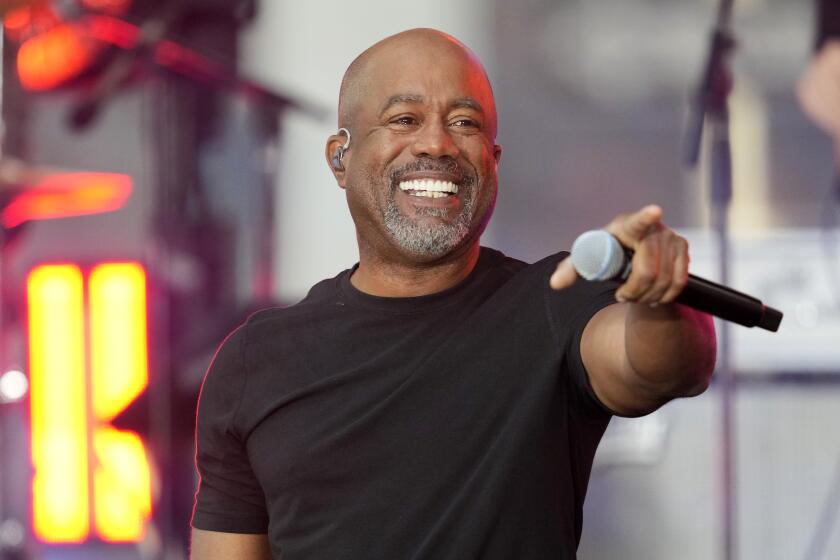POP MUSIC REVIEW : Ex-Husker Du Bob Mould Offers an Exercise in Angst
To borrow two titles from bluesman Sonny Boy Williamson, Bob Mould could be Mr. Downchild taking up permanent residence on Bummer Road. The singer-songwriter-guitarist’s lyrics are tortured reflections on the meaning of it all, and the unrelenting moroseness often kept the audience at arm’s length during the underground rock hero’s local debut as a band leader Wednesday at the Roxy.
That one-dimensional tone contrasted with the balance achieved by Mould’s former band, Husker Du. Drummer Grant Hart wrote and sang a lot of the group’s catchiest songs, and the lack of the pop immediacy he contributed was the chief drawback of Mould’s set.
Mould didn’t even acknowledge his past with the critically acclaimed darlings of the ‘80s alternative rock scene until he performed solo, acoustic versions of “Hardly Getting Over It” and “Makes No Sense at All” during his second encore. Instead, Mould resolutely stuck to the material from his new “Workbook” album, plus two outtakes from those sessions and a version of Richard Thompson’s ominous “Shoot Out the Lights.”
Dispensing entirely with the Husker Du legacy was a sink-or-swim move that left Mould without the safety net of old classics to satisfy the faithful. But Mould also discarded some of the positive elements from his Husker Du association, leaving the performance as uneven as it was promising.
It would have been hard to imagine acoustic versions of Husker Du songs (let alone the full solo acoustic set that Mould will perform at McCabe’s tonight) when the group roared out of Minneapolis in the early ‘80s and won immediate favor with the punk/thrash set.
Husker Du attracted mainstream attention following its 1984 double album “Zen Arcade.” But after moving to the major Warner Bros. label in 1986 and releasing two more albums, the band acrimoniously dissolved last year.
Husker Du’s guitar-bass-drums format occasionally led to monochromatic textures, a shortcoming Mould has addressed on this tour by forming an alternative all-star quartet. Guitarist Chris Stamey (from the dBs) complemented Mould’s sprawling, broad swaths of guitar with pinpoint, crystal-clear solos and fills. Stellar bassist Tony Maimone, on loan from Pere Ubu, offered fluid, constantly inventive bass lines, but drummer Anton Fier’s arena-rock drumming frequently restricted and weighed down the material.
Wednesday’s opening instrumental, “Sun Spots,” showcased the increased textural possibilities as Stamey and Maimone echoed the cello lines from the record. Mould delivered the final verse of “Wishing Well” with a crazed, bug-eyed stare before locking into a ringing, one-note guitar line that attained the nagging obsessiveness characteristic of his best work. The Highlands reel melody of “Brasilia Crossed With Trenton,” one example of the English folk element now surfacing in Mould’s music, proved to be the highlight of the set when it exploded into an intense jam underneath Stamey’s serpentine solo.
The pop harmonies and inviting structure of the aptly named “See a Little Light” made it the one song that really reached out to the audience. Unfortunately, it was immediately followed by “Whichever Way the Wind Blows,” a feedback-laden exercise in Angst overkill that took psychodrama about three steps over the line.
Mould need only look back to Husker Du songs like “Ice Cold Ice” and “It’s Not Peculiar” for samples of his material that have an accessible pop quotient. Now that he has proven that he can stand alone as an individual artist, Mould should enhance the serious side of his music by mixing in material that an audience can more easily embrace.
More to Read
The biggest entertainment stories
Get our big stories about Hollywood, film, television, music, arts, culture and more right in your inbox as soon as they publish.
You may occasionally receive promotional content from the Los Angeles Times.








